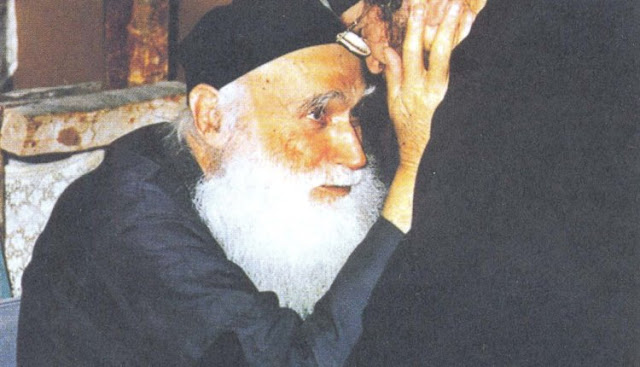It was not imagined by Evangelos, the later gifted submissive, that something that happened to him when he was still a student would encompass the entire rest of his life, characterized by his extreme devotion to cultivating the virtue of obedience.and cutting of his own will.
Once, as a student, he displeased his mother before leaving for school, so, disobeying, grabbed his bag and then went to class, where they started with mathematics.
He missed an exercise in the classroom, in which Evangelos was confused, believing that it would result in a decimal number: "12/4". He then asked his fellow classmate, if he too had a decimal number. "No, it's an integer, not a decimal," said his neighbor. Going out, Evangelos realized that he had apparently blurred his mind, since, as it is known, 12/4 equals 3 (integer).
Elder Ephraim was recounting this incident of his childhood, attributing that blurring at the time of exercise to the fact that he had upset and displeased his mother before leaving for school in the morning.
He thus wanted to emphasize the practical implications of the impractical cultivation of the virtue of obedience and the precision one must have in order not to displease any fellow man, and much more so as not to be disobedient to his seniors, and in particular to his spiritual father.
"I did," Elder said of the incident, "so God didn't bless me for understanding my mistake."
For Elder Ephraim the Katounakia, the subordinate's wreath was considered superior to the martyr, because the martyr was martyred once and went to paradise, but, the subordinate is martyred daily. Every obedience is also called a martyrdom.
"We all say patience," he once wrote at an old age, "but the time comes for it to end, and then the torture begins, the secret, the bitter tear, the heart aches, the heart sighs, the blood."
"Elder said, God said," the Elder repeatedly emphasized, having felt and enjoyed the spiritual fruits of obedience. The mouth of the Elder is the mouth of Christ. The Elder told me: "Do not be afraid! Do not be afraid!"
Elder Ephraim argued that, "if you distinguish what the Elder tells you, you are not obedient, you are the Elder's controller." If the subordinate begins to choose what to obey and not from the mouth of his Elder, what kind of monk is he? The Elder recognized so much value in the precise, detailed cultivation of obedience that he set it as the absolute and solid foundation of the monastic state, since, otherwise, and without obedience, the monk no longer had the foundation, roots, but builds on the sand, and so it crumbles from hour to hour.
Elder Ephraim was saying that the great Elder Joseph the Hesychast, though he was a rector of mental prayer, "though he was at the extremes of silence," urged his subordinates primarily to obedience, and secondarily to obedience of quiet . "From obedience, prayer comes out" summarized Elder Ephraim to those around him, "from prayer comes out theology afterwards," and so this salutary incarnation of the soul's progress takes place.
Do you want to find a prayer? Do you want to pray when you have tears and grace? Do you want to find the way of a monastic? "Obey!" the elder emphasized. "If you obey, then you will find the path that leads to your salvation."
On one occasion, a brother of Elder Ephraim was in the kitchen, doing handiwork. Elder Ephraim was in his cell, also doing his work, but at the same time in prayer, "I mean graceful prayer, the hour of grace" as he said. At one point, his brother informed him, "Elder, the fire has gone out!" They were also cooking at around the same time, and Elder Ephraim had to go to preserve the fire with the firewood.
The Elder, at the time his brother had spoken to him about going to the fire, he did not want to miss the graceful moment of prayer, knowing from experience that grace comes unexpectedly when praying, stays as it pleases, and leaves again unawarely "It can take you five minutes, it can take an hour," as he used to say. And so, Elder Ephraim was intrigued by his reckoning that, "Now that I have, in some way, spiritual food, let me not go to the fire, and go later, when I see that grace begins and contracts."
"That was it!" The Elder admitted, narrating his personal incident. As he narrates, he compliments the above account - of obedience to his brother - instead of keeping grace, it is gone!
"I was left untouched" as it was typically confessed. Grace goes, prayer goes, everything goes. "I say, now, what did I do? I lost obedience and lost the prayer."
Curated by: Kostas Panagopoulos

No comments:
Post a Comment
Note: Only a member of this blog may post a comment.